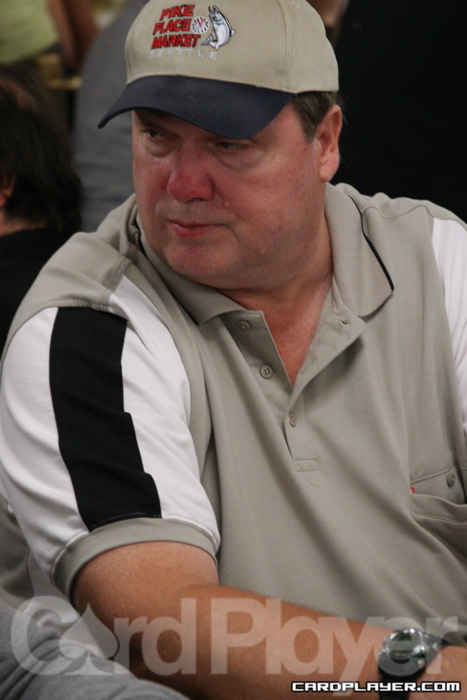WSOP: History -- 1990 RecapMansour Matloubi Wins One of the Largest Pots in WSOP History Against Hans "Tuna" Lund and then the World Championship |
|
|
Benny Binion passed away on Christmas Day in 1989, making the 1990 World Series of Poker the first without its creator holding court over the festivities. His passing was yet another step that the tournament took from the original Texas road gamblers reunion it had started out as in 1970. It was now becoming a game for everyone, as evidenced by the past two champions, the first foreign-born player (Johnny Chan ’87-’88) to win as well as the youngest (Phil Hellmuth ’89). As poker evolved more and more as a game for everyone, it also grew in size accordingly. The number of preliminary events in 1990 had grown to 14, and the number of participants in the main event stood at 194.
The preliminary events were won in large part by relative newcomers and unknown players that year, but three familiar faces were able to claim bracelets. “Amarillo” Slim Preston won his fourth bracelet ($5,000 pot-limit Omaha), while John Bonetti won his first ($5,000 deuce-to-seven lowball). Berry Johnston picked up his second ($2,500 limit hold’em).
Two of these preliminary bracelet winners went on to make the final table that year. Bonetti and Johnston both appeared among the final nine in the 1990 main event, and they were joined by Stu Ungar, Rod Peate, Al Krux, Jim Ward, Dave Crunkleton, Hans “Tuna” Lund, and Mansour Matloubi. Ungar, Peate, and Krux failed to make the final television table of six, and once things got started at that table both Johnston and Krux were busted on the same hand, and they were followed to the rail by Ward. This left three final contestants to battle for bracelet, Crunkleton, Matloubi, and the crowd favorite from Reno, Nevada — "Tuna" Lund.

 9
9 5
5 and Crunkleton moved all in for 270,000. Lund called him down and flipped over 10
and Crunkleton moved all in for 270,000. Lund called him down and flipped over 10 9
9 . Crunkleton flipped up Q
. Crunkleton flipped up Q 10
10 and the turn and river were dealt 8
and the turn and river were dealt 8 9
9 . Action was now down to heads up and "Tuna" was cruising.
. Action was now down to heads up and "Tuna" was cruising.
Lund held 1.1 million when heads-up play began, to Matloubi’s 840,000. Matloubi was an Omaha specialist who might have even been shocked himself to have made it this far in the main event, but very early in the match he went from challenger to favorite to win the ’90 world championship thanks to one of the most memorable hands in the annals of WSOP history. Matloubi raised preflop to 75,000 with pocket tens in the hole, and Lund made the call with A 9
9 . The flop was dealt 9
. The flop was dealt 9 4
4 2
2 and Matloubi bet 100,000. Lund raised to 250,000 and after a few minutes of silent deliberation, Matloubi moved all in. Lund then went into the tank, and after thinking for a while he counted out the chips to make the call, paused once more, and then pushed them into the middle of the table. The turn and river fell A
and Matloubi bet 100,000. Lund raised to 250,000 and after a few minutes of silent deliberation, Matloubi moved all in. Lund then went into the tank, and after thinking for a while he counted out the chips to make the call, paused once more, and then pushed them into the middle of the table. The turn and river fell A 10
10 .
.
 Lund had pretty much lost the world championship on that hand (the pot was worth a WSOP record at that time – 1,628,000). He refused to go down quietly and battled for four hours to regain the dominant chip lead he once held. He did regain a slight lead once, but he was knocked back down to his final 300,000 when he decided to move all in with pocket fours. Matloubi woke up with pocket sixes and he made the call. The board changed nothing for either player and Matloubi was the champion. This was another first for the WSOP; Matloubi was the first foreign national citizen to win the world championship. The global movement of the WSOP continued.
Lund had pretty much lost the world championship on that hand (the pot was worth a WSOP record at that time – 1,628,000). He refused to go down quietly and battled for four hours to regain the dominant chip lead he once held. He did regain a slight lead once, but he was knocked back down to his final 300,000 when he decided to move all in with pocket fours. Matloubi woke up with pocket sixes and he made the call. The board changed nothing for either player and Matloubi was the champion. This was another first for the WSOP; Matloubi was the first foreign national citizen to win the world championship. The global movement of the WSOP continued.
WSOP history article links:
Preludes – 1970 – 1971 – 1972 – 1973 – 1974 – 1975 – 1976 – 1977 – 1978 – 1979 – 1980 – 1981 – 1982 – 1983 – 1984 – 1985 – 1986 – 1987 – 1988 – 1989
